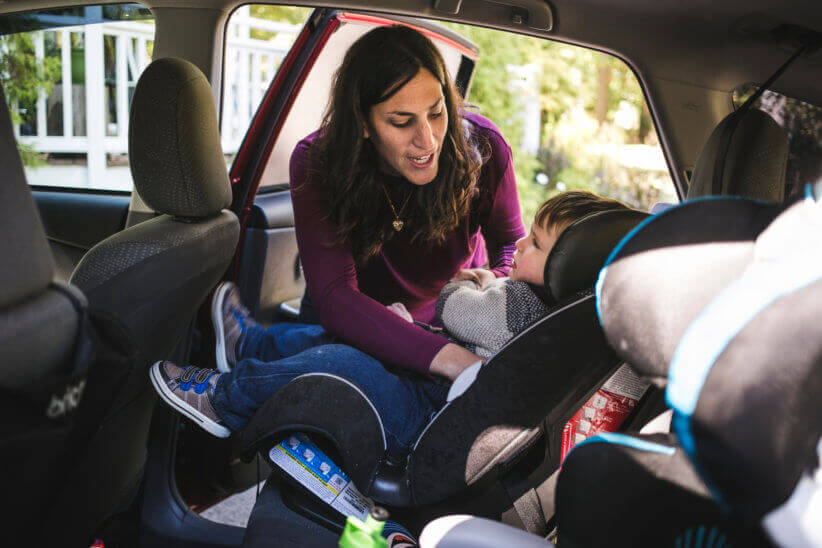
Editor’s Note: For more on nursery schools in New York City, check out Part 1 and Part 2 of our comprehensive preschool directory, and a glossary of school philosophies to help you with your search.
If you’re interested in applying to private nursery school in the city, then chances are you’ve heard some anxious rumors and reports about the process. And, yes, there’s competition for spots based primarily on supply and demand, but the important fact to latch on to is that the vast majority of interested families find spots at nursery schools that they like–as long as they do their homework. This article is your homework.
But before we get into the nuts and bolts of it, there’s an important issue to address: Why bother? Is it worth it? Is it essential? Our view is that, if you can afford it, then sure it’s worth it. Most nursery schools are loving and fun environments for kids, where they make their first regular set of friends and learn how to get along in a school environment. What’s more, for many parents—and especially parents with their first child—nursery school often ends up being a very important part of their family life, a community of parent friends with shared interests and priorities.
1. Mark Your Calendars
The Tuesday after Labor Day is when a number of nursery schools give out their applications—and many of them reach capacity before the day is out. So miss it, and you won’t be able to get an application to those schools for the year. This means you need to begin your school research in the prior months (see point 2), to have a plan for what schools you want to get applications from. And for that special Tuesday itself, we recommend starting at 9am and recruiting a trustworthy family member or friend to help you work the phones and computers, keeping in mind that the popular nursery schools may give out their applications by noon. “Staying organized and on top of those dates and deadlines is really critical,” explains Roxana Reid, educational consultant and founder of Smart City Kids. “Otherwise, you can be out of the process before you even get started.”
Special Tip: Visit the website, or call the school, to find out beforehand whether a school distributes applications online or over the phone.
2. Do Your Research
Gabriella Rowe, head of the Mandell School, recommends coming up with “Must Have,” “Would Be Great But Not Critical,” and “Who Cares?” lists to differentiate the qualities you’re looking for in your child’s education. The lists may evolve, but they’re a good way to remember what’s truly important to you as you go through the process. Once you commence your research, visit the website of every school you’re interested in. Consider buying Victoria Goldman’s The Manhattan Directory of Private Nursery Schools, which profiles over 150 preschools and offers parents advice and tips for narrowing their search. Likewise, the Parents League offers a schools guide, personal consulting, and seminars. If you seek additional advisory services in the course of the process, groups like School Search Solutions, Smart City Kids, and School Search NYC, specialize in local nursery and ongoing school admissions much like other companies specialize in college admissions. It’s recommended that parents contact approximately ten schools to get eight applications. And you may want to widen your search a bit if you live in an area densely populated by families, such as the Upper East Side.
Special Tip: Make sure you apply to a range of schools, not just the most popular and sought-after schools in your neighborhood. Better to diversify and increase the odds of getting in somewhere.
3. Weigh Private And Public
Tuitions at some NYC private nursery schools can range between $15,000-30,000 per year. For that reason, many families opt for public school Pre-K programs, which are free but only offered the year before Kindergarten. Also, until now, the city hasn’t automatically guaranteed families Pre-K spots. (The available spots have been distributed through local school lotteries.) If the city introduces “Universal Pre-K” this fall, then any interested families will get a spot. Some families who bypass private nursery school also look to “preschool alternative” programs at local activity and enrichment centers. The best of these programs offers a curriculum that is similar to nursery program, but don’t have the elaborate admissions process.
Special Tip: If money is an issue, you can also look to a quality nursery school with a parent-friendly, flexible schedule. “Consider a half-day schedule for three days a week,” says Bill Swan, the head of The Goddard School. “This can result in a huge savings over full-day for five days, and your child is still receiving a curriculum-based program delivered by highly trained teachers.”
4. Learn Educational Philosophies
When considering nursery schools, factors like location, tuition, and general reputation are typical starting points. But parents should also be very mindful of a school’s educational philosophy and how that plays out in the classroom. “If people stay focused on the goals and philosophy of the school and go with their gut as far as feeling comfortable in a particular setting, I believe they’ll end up at the right place,” says Sharon Shorofsky Mack, the Director of Education at the JCP Downtown.
Special Tip: The most popular pedagogies include Progressive, Montessori, Developmental, and Traditional—and Reggio Emilia has become more popular in recent years. A little time on Google is all you need for an overview of the philosophies; just keep in mind that many schools use modified versions or a mix of their favorite qualities of different approaches.
5. Be Aware Of Age Requirements
Some Manhattan programs begin at or around age 3; others begin with classes for 2-year-olds. In the latter cases, you’ll want to know whether a school is offering most of their spots for age two, and therefore are likely to have much fewer spots available for a kid who comes in at 3.
Special Tip: Some children may be ready for school at 2, others may benefit from beginning with part-time sessions or simply waiting a year. Trust your instincts.
6. Vibe The School Director
Ask yourself: “Is this someone whose opinion and instincts I trust?” Since she is the leader of the school community, you may need to have a close and cooperative relationship with her, especially if any emotional or developmental challenges come to the fore, which is quite common in the nursery school years.
Special Tip: Families that are likely to apply to private school for Kindergarten and beyond will be especially interested in a nursery school with a good track record for successfully guiding parents through the “ex-missions” process.
7. Make the Most of Open Houses And Interviews
Most nursery schools host tours and open houses, and many require interview sessions in addition to having your child (along with a parent or caregiver) participate in a group play date led by teachers from the school. During the play date, don’t panic if your child does something embarrassing or needs a diaper change. Educators understand that children are children. But remember that, on some level, parents are being evaluated as well, because school directors are looking for families who will be a positive part of the community. Therefore, as Wendy Levey, Director of Epiphany Community Nursery School, recommends: “From start to finish, treat the process with respect, care, and attention.” Whether it’s the school tour, the interview, the play date, or merely a call to make sure your application was received, be polite, considerate, and engaging—which includes showing up on time, turning off your cell phone, and asking meaningful questions (not basic ones that you should know by looking at the school’s website).
In addition to making a good impression, any event at the school is an opportunity to get a better sense of it and get your questions answered. So take note of the classrooms and hallways, the teachers, and the students. Do they seem happy? Engaged? What’s the overall vibe? Likewise, what are certain aspects of the program that you’d like to understand better?
Special Tip: Don’t be late for school appointments. Enough said.
8. Question Class Sizes And Times
Parents care a lot about class size and student-teacher ratios (as they should), but keep in mind that licensed nursery schools have specific limits set by the Department of Health.
Special Tip: If you’re set on a certain school, it may help to apply for the afternoon class since morning classes are typically more popular.
9. Write A First Choice Letter?
Because of the competition for limited spots, many parents feel compelled to send a “first choice letter” to their most desired school, but most schools don’t require them or even prefer them. The increasingly common option is to phrase the letter in less binding terms, noting particular reasons a certain school is a good match for them.
Special Tip: If you’re concerned that the school you favor may not appreciate a letter, we strongly encourage you to use the school tour to get clarification on whether they would prefer to hear from you near the end of the admissions season.
10. Use Recommendations Or Referrals
Let’s put it this way: Do not send in an impersonal recommendation from a famous person who doesn’t really know your child and has nothing to do with the school. However, if a good friend of yours is already a member of the school community, then a recommendation from her couldn’t hurt.
Special Tip: Some people assume that getting into nursery school is all about who you know. It’s just not true for the vast majority of people applying, so don’t put too much time into trying to identify a magic recommender.
11. Be Yourself
It’s impossible to completely avoid the hype surrounding nursery school admissions in the city. But try not to be alarmed by stories of a dozen rejection letters; the wisdom and strategies we’ve distilled in this article should help a lot. “Anyone who has done their homework and really gets their ducks in order usually ends up somewhere they are happy,” Levey, of Epiphany says, echoing many of the school directors and experts we spoke with. Most of all, focus on schools that feel like a truly good fit for your family and your child, and be sure to apply widely enough that it won’t come down to the decision of a few popular schools.





















